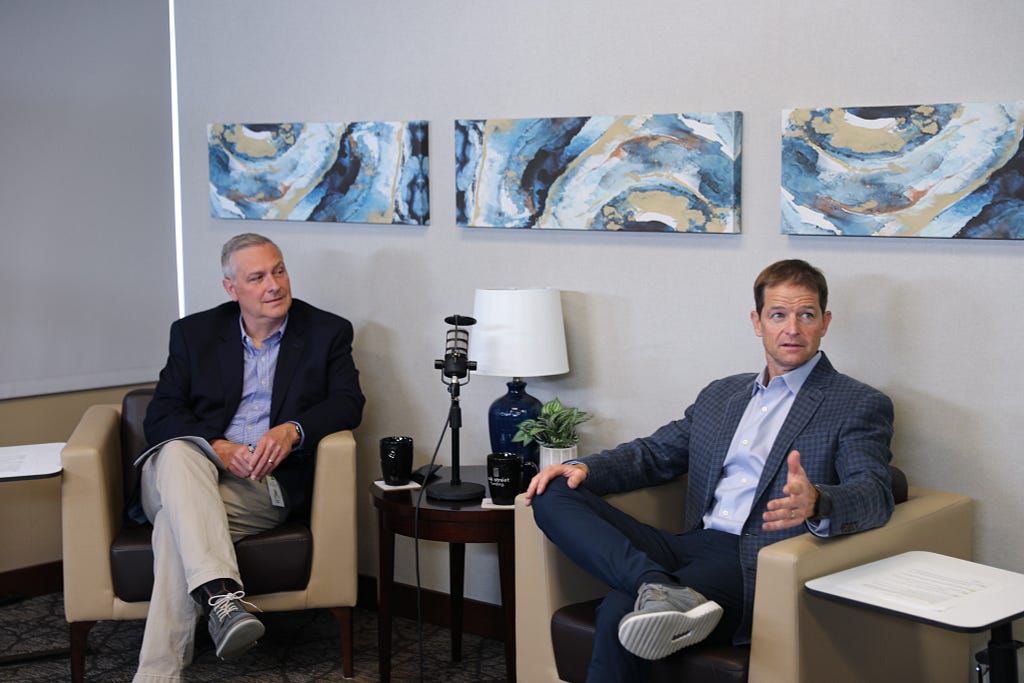Rick Dennen of Oak Street Funding: 5 Things You Should Do To Become a Thought Leader In Your Industry
An Interview With Dina Aletras
I always tell my employees that I would rather they ask for forgiveness than permission. This creates a culture of trust where employees feel confident in making decisions and exploring creative solutions. Employees are given opportunities where they can stretch their abilities and grow as individuals. Ultimately, this fosters alignment with our organizational strategy and leads to greater success.
As part of our series about how to become known as a thought leader in your industry, I had the pleasure of interviewing Rick Dennen.
Rick Dennen is CEO of First Commercial Finance, a division of First Financial Bank, which operates under the brands of Oak Street Funding and First Franchise Capital Corporation®. Since founding Oak Street Funding in 2003, Dennen has overseen the expansion of customized lending offerings for RIAs, CPAs, and BHPH dealerships, while establishing third-party servicing for commercial, specialty financing portfolios. First Commercial Finance has experienced exponential growth resulting in a portfolio exceeding $1 billion under Dennen’s leadership.
Thank you for taking the time to speak with us! Our readers are eager to learn more about you. Could you provide some background information about yourself?
I earned both a Bachelor of Science in Accounting and a Master of Business Administration from the Indiana University Kelley School of Business. While at IU, I competed in distance freestyle swimming events under legendary coach Doc Counsilman and was named captain of the swim team two of those years. I was later awarded the Z.G. Clevenger Award by the IU athletic department. I am a licensed Certified Public Accountant in Indiana, as well as a licensed agent for life, accident and health products in Indiana and hold one or more of these licenses in 45 other states.
Before founding Oak Street Funding, I was a partner in a venture capital firm serving as the CFO and board member for portfolio companies within the fund. I was also a senior manager at Deloitte serving public and private companies in the financial services and manufacturing industries. In 2003, I founded Oak Street Funding and the rest is history.
What establishes you as an authority on thought leadership? Could you briefly share your expertise with our readers?
Authority in thought leadership develops from experience. I have experience leading a start-up through three different ownership structures, which culminated in ownership by a public bank (First Financial Bank). I have experience with successful leadership transition, all within the same organization.
What are the most significant disruptions you foresee in your industry over the next five years, and how can businesses adapt to these changes?
I think artificial intelligence will be the most significant disruptor not only in financial services, but in the world as a whole. At Oak Street Funding, we are actively seeking ways to implement AI technology in our day-to-day operations. While AI offers tremendous potential, it also challenges the traditional roles of employees. We need to be prepared for a future where AI handles routine tasks, freeing up human capital for more strategic thinking, creative problem-solving, and building strong client relationships. I believe that embracing AI is the way forward. It is important for business leaders to begin researching and implementing AI now to avoid being left behind the curve.
Can you explain the benefits of becoming a thought leader? Why is it valuable to invest time and resources into this?
Thought leadership is important to help train and educate the next generation of leaders. Additionally, as a business leader in the financial services industry, we don’t sell a physical product, so we must sell ourselves and our ideas through thought leadership, thus building trust, attracting ideal clients, and ultimately, growing our businesses. Clients are more likely to choose a firm seen as an industry authority, with leaders who are trusted advisors.
Can you share an example of a significant challenge you faced in your career and how you leveraged innovative thinking to overcome it?
Nearly two-thirds of venture capital-backed startups fail due to lack of capital. During the 2008 banking crisis, our funding sources began to shut down and we faced the challenge of reduced capital. Our executive team met weekly to reevaluate our portfolio and make allocation adjustments to maintain financial stability. We relied on our innovative proprietary software, prioritized transparency, and leveraged data-driven performance metrics.
Now that we have covered that, we’d love to hear your advice on becoming a thought leader. Can you share five strategies that someone should follow to gain recognition as a thought leader in their industry? Please include examples or stories from your own experience for each strategy.
First and foremost, building a reputation for credibility is paramount. This includes protecting your reputation by adhering to the highest ethical standards and being true to your word. Visibility is also key. By actively putting yourself out there, engaging in relevant discussions, and using digital marketing to amplify your voice, you can connect with a wider audience. Lastly, consistent performance, delivering valuable insights and demonstrating expertise over time, is what solidifies your position as a trusted authority in your field.
How do you foster a culture of innovation within your organization, and what practices have you found most effective in encouraging creative thinking among your team?
I always tell my employees that I would rather they ask for forgiveness than permission. This creates a culture of trust where employees feel confident in making decisions and exploring creative solutions. Employees are given opportunities where they can stretch their abilities and grow as individuals. Ultimately, this fosters alignment with our organizational strategy and leads to greater success.
Who do you think is an outstanding example of a thought leader? What specific qualities impress you about this person?
I have a lot of respect for Warren Buffet and Jamie Dimon. They have consistently demonstrated successful strategies and are very willing to put themselves out there to share their knowledge with the business world.
How do you stay informed about the latest trends and developments in your field, and how do you incorporate this knowledge into your strategic planning?
I regularly attend industry conferences and subscribe to many publications to stay abreast of the latest developments. As a company, we take this industry knowledge into consideration when laying out our strategic roadmap.

Some people feel that the term “thought leader” is overused and has lost its impact. What are your thoughts on this?
Thought leadership in the financial services industry is a powerful tool, even if the label itself is subjective. I may think someone is a great thought leader, but a colleague may disagree. However, that shouldn’t deter leaders from sharing their thoughts and ideas. When leaders actively share their insights, it builds collaboration and sparks innovation.
How do you balance short-term business goals with long-term strategic vision, especially in a rapidly changing market?
My long-term strategic vision is one to three years. From the long-term vision, our executive team then identifies the actionable short-term projects necessary to achieve that vision. This method promotes continuous improvement, while allowing us to still adapt to changes. If necessary, we can adjust a short-term project without losing sight of the long-term goals.
Can you share your favorite “Life Lesson Quote”? How has it been relevant in your life?
“Life isn’t linear.” Life will have high highs and low lows. Personally, I’ve learned more from the bad times than I have from the good times. Those down times will teach you the most important lessons if you’re willing to learn from them.
Many influential figures in business and entertainment follow this column. Is there someone you’d love to have lunch or breakfast with? They might notice if we tag them.
I’d love to have a conversation with Michael Jordan.
How can our readers further follow your work online?
Visit https://www.oakstreetfunding.com/media-and-press#media-coverage for a library of my published thought leadership pieces.
Thank you so much for your insights. This was very insightful and meaningful.
About the Interviewer: Dina Aletras boasts over 20 years of expertise in the corporate media industry. She possesses an in-depth understanding of growth, strategy, and leadership, having held significant roles at some of the UK’s largest media organizations. At Reach PLC, the UK’s largest tabloid publisher, she served in various director capacities. Additionally, she held leadership roles at The Independent Magazine Group and DMGT. Her extensive knowledge spans editorial, digital, revenue, sales, and advertising. Upon relocating to Switzerland, Dina took on the responsibility of managing and promoting the international section of Corriere del Ticino — CdT.ch pioneering the English page “onthespot.” She also was the Co-Editor of Southern Switzerland’s first official Italian and English bilingual magazine.
Rick Dennen of Oak Street Funding: 5 Things You Should Do To Become a Thought Leader In Your… was originally published in Authority Magazine on Medium, where people are continuing the conversation by highlighting and responding to this story.


